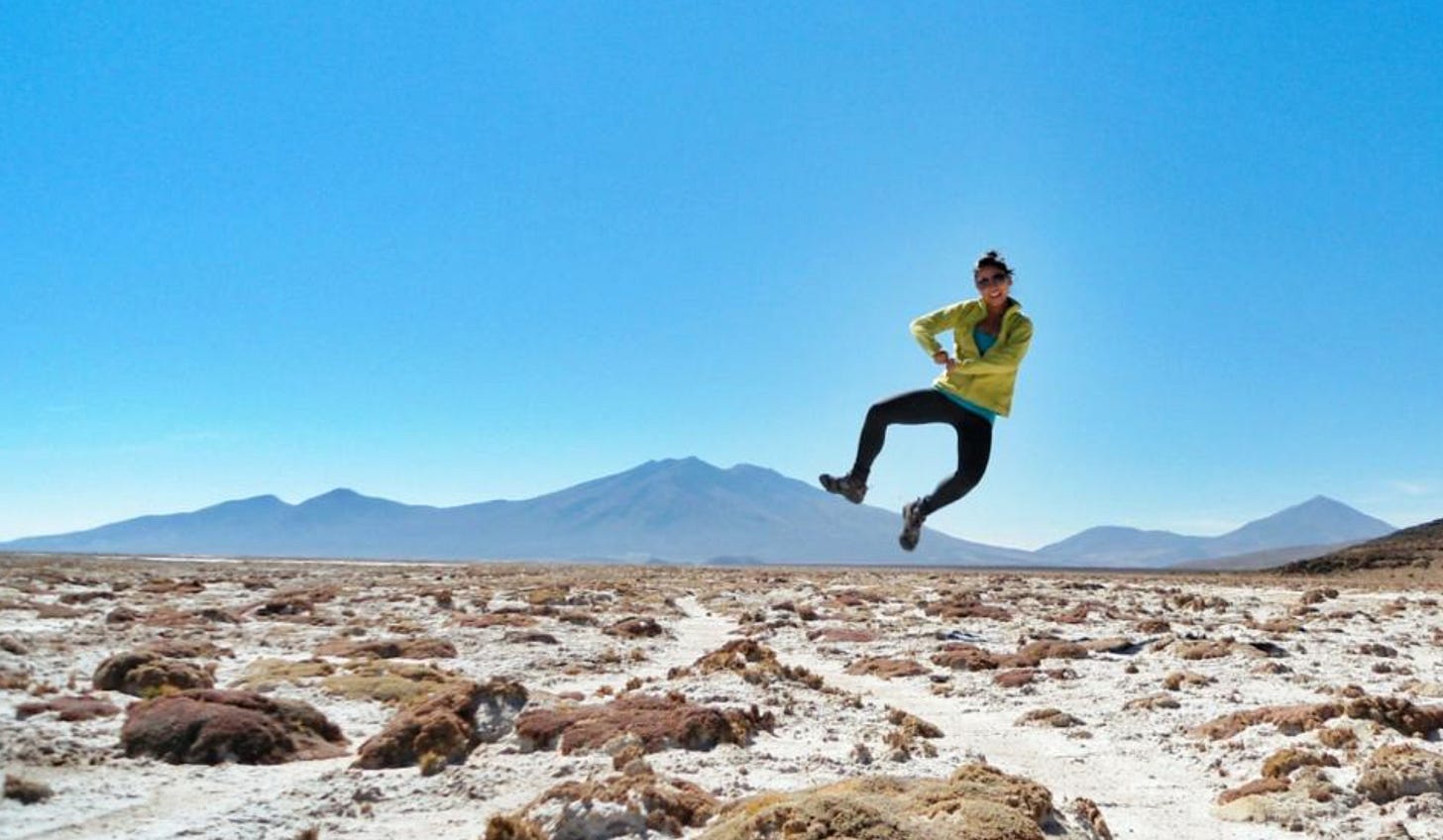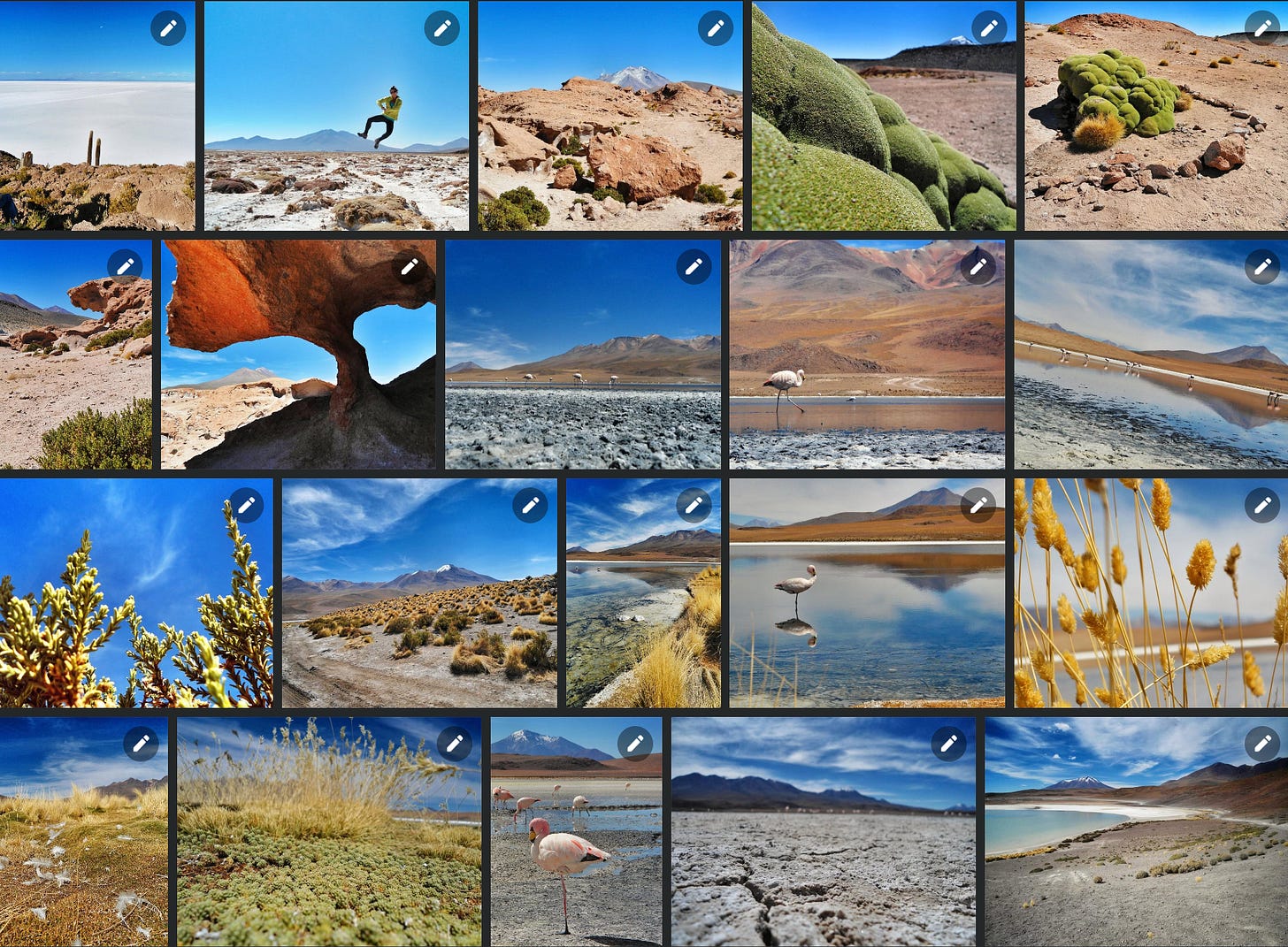The cost of really seeing the world.
Entitlement, extraction, and the uneasy echo of capitalism as tourism
When the Contrast Is Too Loud to Ignore
I wrote this while surrounded by beauty and discovering my own freedom—while also facing deeply uncomfortable truths.
Tourist towns in impoverished nations reveal a stark contrast: what we come to consume, and what’s left behind. I’m trying to look clearly without casting blame. Just witnessing. Just wondering.
As I meander back through my decades of writing, I find myself piecing together the journey—how I went from partying in celebrity mansions as a creative director for big brands and tech startups while dating a TV producer in Los Angeles… to living on five dollars a day, sleeping under an umbrella in my bed beside my three-year-old, in the sweltering jungle off-grid near Machu Picchu, Peru.
It’s these moments—of contrast, of discomfort, of revelation—that cracked me open to a different reality. And it’s in that rawness where some of the truest lessons live.
WRITTEN IN 2013
from the Uyuni Salt Flats Tour in the heart of Bolivia.
Tourist Eyes and Local Tensions
Going to really touristy areas makes me profoundly uncomfortable.
I realize how we look to a local—talking loudly, haggling over cents that are food for someone else, and drinking in the middle of the day. I see the giant packs filled with expensive things like brand new gear and nice cameras. I see the outsiders keeping to themselves, not speaking the language, tossing money around like it’s no big deal. I see a general lack of respect to the culture in which they are staying and a view of condescension or “poor you, little country.”
I see bucket list travelers everywhere.
A note on bucket lists: I’ve had one too. I think the planning and goal setting can be useful. I just think the rush to check something off to be happier about the accomplishment than the experience is sad and a really limited way to travel. Is it just a new branch of colonialism?
“The cost of seeing beauty shouldn't be someone else's loss."
I’ve Been There Too
It happened in Cusco for a few days, Isla del Sol, and now here in Uyuni, Bolivia. Packs of brightly and synthetically outfitted, on and off buses: tall, loud white people shouting and drinking all day. I mean, look at me in my skittles colored fleece now…
And then there is the gaze of the the local human looking into the tourist bubble, while they are in their own country.
I get it—sometimes I’ve traveled that way too, I still am. I’ve been one of the drunk girls in Thailand, the American couple in Colombian plazas drinking rum (although it was part of the youth culture and we were singing with locals).
You work hard. You want to have fun, unwind, and relax. You deserve a drink and a good time since most of life is wake up, work, repeat.
But do you actually see the world? Do you actually unwind the damage that is done from living an unbalanced life in one or two weeks? I don’t know. I see things very differently this time around. I see that the people resent it, get bitter and then boost prices to have to deal with people’s crap and being treated as less-than.
In the more touristy areas, you can feel the hatred.
“Who do you think you are with your entitlement? We can barely feed our families now because the cost of living keeps going up but the only people that benefit from capitalism are the top 5–10 percent. Everyone else just has to keep spinning harder to maintain the same lifestyle.”
What We Don’t Want to See
I speak the language and I care. I care that capitalism means exploiting poor countries for their resource with the cost of their health, their families' closeness. I see the generations that are younger addicted to Facebook and standing in lines to pay their cellphone data bills outside of Claros everywhere.
I see kids not standing up on the bus for pregnant mothers or the elderly. I see eyes flash when I have my iPad out. I see them fighting for a new modern lifestyle to make their life easier yet losing their roots at a rapid pace. The imported culture is shifting the generational values so quickly. What is gained? What is lost?
Progress and the Price of Growth
I get it, the world changes. Hell, I love progress, coming up with beautiful solutions to humanity's problems. I'm just sad that Monsanto seeds that were made by scientists to fight hunger are rushed in without knowing results.
I like my iPad. I'm devastated that they are built the way they are, on the backs of barefoot, child cobalt miners. That economic growth comes on the backs of hard workers and real humans—whether it was slaves, indentured servants, or undeveloped nations fed mass media showing them how different their worlds are, making them feel like theirs is subpar. It’s grossly horrific.
Heck, even the advertising and TV shows: tall white European people everywhere screaming you short brown people don't compare. Buy this and you can raise up.
False need, guys. It really breaks my heart.
I'm trying to figure out how I feel about it and what to do next that recognizes and honors the balance of things.
“We only have our own values from our own experiences—
they just tend to collide here.”
The Mess of Mixed Feelings
Maybe I'm wrong. Maybe this is just the way it goes. Evolve or die off. That's where I get confused. Sometimes I do see really ugly parts of the culture—little ladies pushing me over to get to the Bolivian immigration office one second faster, saving approximately two minutes of her life.
But I don't know where she's going, and I'm sure she assumes I'm a spoiled kid. In many ways, I am compared to them.
Sure I had my moments of judgments: Sometimes I see the addiction to fried and sugary starchy foods here in South America and think, Well, you have it coming. Ouch. Is that really fair? Nope, I think of the mass marketing efforts of Nestlé and Coke in poor countries, and I wonder who is benefitting? Sugar conglomerates built on evil practices? How much do you sell to under developed countries when you “invest” 20 million in marketing?
I really fight with myself here. I've moved forward from marketing and selling people things they don’t need. I’ve learned so much and keep learning… with open eyes brimming with tears from the injustice.
What I Keep Coming Back To
Anyways, it all comes to light in touristy areas. The contrast couldn’t be more stark. I've met so many beautiful travelers and so many beautiful locals. We only have our own values from our own experiences—they just tend to collide a bit here.
And then you wonder how black and white black and white really are.
I'm trying to observe rather than judge. But we are human, and I do find myself making snap judgments or over-romanticizing. But for me, it’s worth the perspective shift.
My trip in 2013 was called my Spirit Quest. It wasn’t to just vacation but invest in myself, ask myself hard question and ponder who I was, and what I wanted for the first time. It was transformational to my perspective as I mostly went off the beaten path and found myself lost more than found. Since then I’ve take a deeper dive to immerse myself in many worlds that go unseen.
Would you consider supporting this chapter of my creative and spiritual work?
Here are a few ways support could flow:
✨ Become a supporter on Substack
✨ Send a one-time gift via PayPal
✨ Buy Me a Coffee










This article takes a close look at capitalism and compares those who have the most material assets with those who have almost nothing. Then it argues that capitalism as a means of creating a just world with truly meaningful encounters and connections between people, beyond mere cash transactions, isn't the right path to follow.
It says that work must be done to bridge the ever-widening gap between the haves and the have-nots, so that culturally diverse groups can enrich each other without stirring those feelings of loathing and resentment for being exploited that are now barely hidden beneath the surface of native/tourist interactions in the poorer countries such as Bolivia and Peru.
This is a well-informed and insightful article that doesn't pull its punches. Thank you, Megan.
Ahhhhhh, Megan!
You bring out the soul spirit within me.
I’ve always felt that way about American tourists and feel naturally uncomfortable when I am in another country and hear them complaining about a wait person or food that was not McDonald’s. It’s terribly embarrassing to me.
I do not have what others call a bucket list, although there are many places that I would love to travel to and in.
I’ve been pegged in several countries by people who think I am Greek, Parisian, or maybe Spanish. It’s humbling and I do appreciate not sticking out like a sore thumb because I am there to imbibe in their culture with them. I’ve always felt that way.